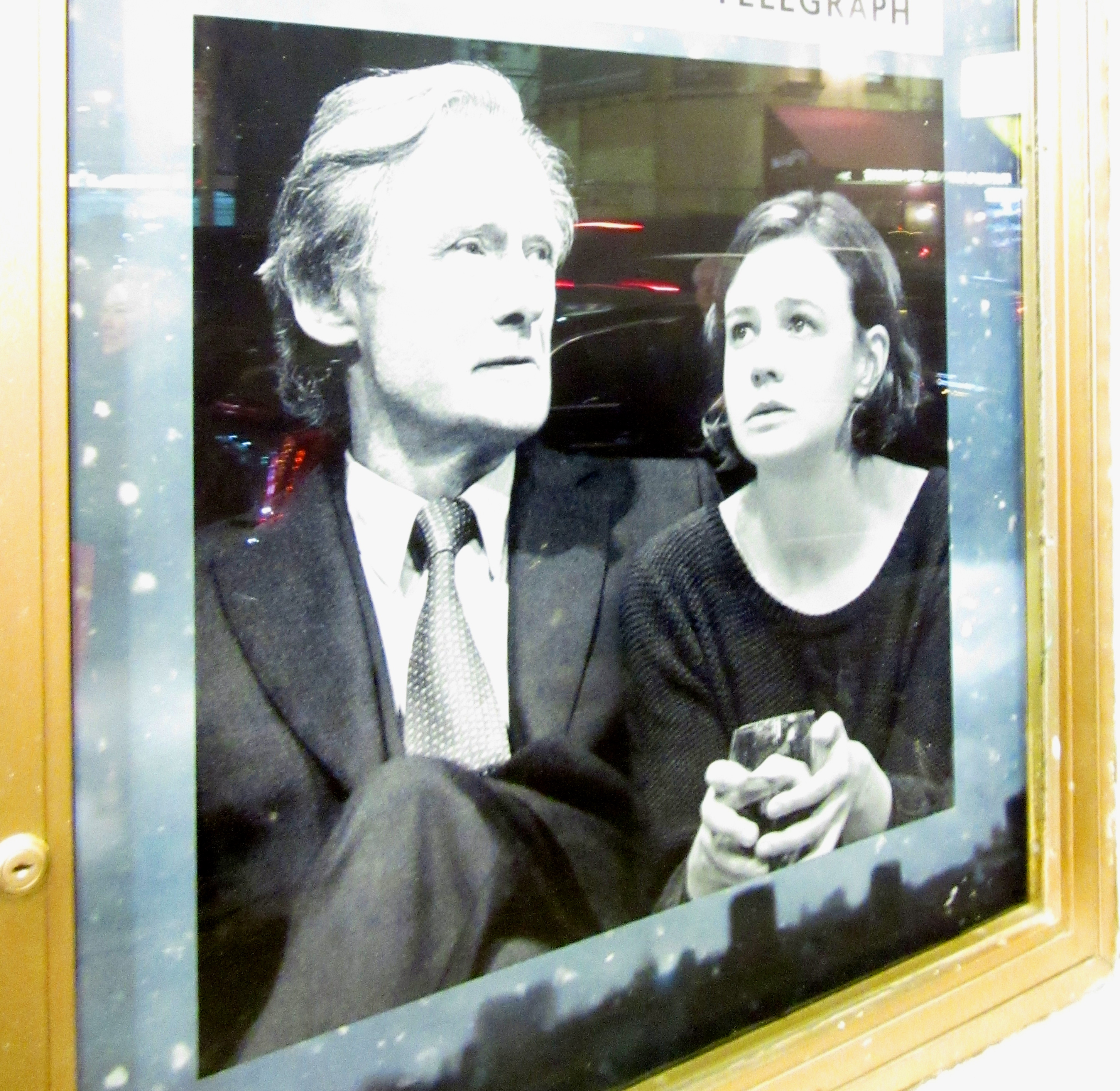Carey Mulligan is as good onstage at the John Golden Theatre as she is in the movies. As Kyra, the passionate teacher in David Hare‘s SKYLIGHT, she seems, quite simply, settled into the modest flat and routine, hard-nosed realism of the character. It is her place, her home, her way of being. Echoing what I thought at the time was the unspoken theme of An Education, the film in which Mulligan made her name internationally, she is committed to the complexities of what it means to teach and to learn, in school or in life. When she says aloud to her former, ex-, older, wealthy, entrepreneurial lover Tom, played by Bill Nighy, that education is equal parts haven and challenge, it isn’t like hearing boilerplate from a mouthpiece but rings with the timbre of insight refined by experience. And when, after the intermission, she delivers what must be two of the most perdurably relevant speeches of the contemporary theater, written by Hare in 1995, even those who do not applaud them are awed to silence by her frankness.
Mulligan speaks them directly to Nighy, whose Tom, if one takes him as a symbol, is what today, 20 years on, we call not just the one-percent, but the top one-percent, lest, I assume, we mistake it for the bottom. It is astonishing to hear her rue the concern of the class to which he belongs that they be liked and admired, seen not as people who “make money” but who “create wealth,” because that sounds, after all, so much better. It’s the rhetoric you hear today, from the same class, digging in post-2008. Imagine the narrator of Fitzgerald’s “The Rich Boy” saying to the face of the title character, who like Tom is basically likeable, “Let me tell you about the very rich,” and you get a sense of Kyra’s boldness. Mulligan carries it off with a matter-of-factness that borders on moral genius. I do not, as a rule, seek overt relevance from the theater or the arts in general, but Hare’s play, with Mulligan in it, makes it work, and, in a Broadway house tilted by its nature toward the relatively affluent, that she was either solidly applauded or listened to with respect contains a germ of hopefulness. It was the most effective bit of political theater I have seen for years, if not ever.
It helps that Nighy’s Tom is no villain underneath it all. Indeed, he delivers some pertinent socio-economic zingers of his own, put downs of the management gurus who took over his chain of high-end restaurants after he went public, just to pay themselves more than they are worth while giving him, titular head of the company, the short end. They may need him, if they care about maintaining quality, but all they really want is his name and the value it implies. This gets, understandably, under his skin, because it reduces him, in fact, to a symbol of quality rather than a producer of it; and when, after listening to Kyra’s speeches, he objects that she (too) is reducing him to a symbol (of the self-regarding class he has joined) something pertinent is said by that as well. Albeit in a double-edged way: for he has spent the whole play reducing Kyra’s flat, her ideals, the neighborhood she lives in, and by implication her, to symbols of moral inadequacy, poor taste, and bad choices, all to explain away the lives most people lead as a reflection of lesser worth.
On the surface, SKYLIGHT is a relationship drama. Kyra’s ex-lover shows up at her place in a dingy district of London, unannounced, on the same day as his son, Edward, who felt abandoned when, after the affair was discovered by Tom’s ailing wife, she left the relationship. In fact there is a lot of contrivance in this setup, but Hare is so sure-handedly naturalistic and the director Stephen Daltry so adroit in turn, that one gets over it pretty quickly. Bob Crowley‘s design, of beehive flats glimpsed through the interstices of Kyra’s own, is an ingenious blend of naturalist and expressionist elements; the walls separating kitchen from bathroom or living room from bedroom slide open and shut like skin peeled from a wound and grafted on again. Devices like that make it hard, even if you are inclined to do so, to shrug off the play’s politics as a portrayal of how some people think rather than as an exposure of real social structures.
Above all there are the actors, even if their relative ages don’t seem exactly right for the parts as written. Nighy, it goes without saying, is a fine one, wryly comic and indignant, although it wasn’t clear to me whether his body language, like that of a well-mannered marionette, was an actorly quirk or a character trait. Matthew Beard‘s down-to-earth Edward is low-key in a way that builds up to a powerful presence, suggesting the possibility of change beyond the final scene. Mulligan shines, for her part, because she is even lower-keyed. Whatever personas she came with she has shed, including any that we, by way of preconception, might have forced upon her. She is someone named Kyra, and she teaches poor kids at school and lives in a modest flat, and she once had a rich lover, named Tom.
SKYLIGHT plays through June 21 at the John Golden Theatre. For information click here.
